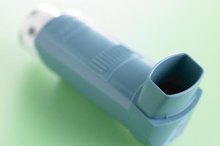Antihistamines for Asthma
Certain irritants or allergies can trigger an asthma attack, which causes the airways of the bronchial tubes to constrict, resulting in extreme difficulty in breathing due to the inflammation and increased mucous produced by the lungs, according to MedlinePlus 1. Tightness of the chest, wheezing and coughing indicate swollen and irritated airways. Antihistamines prevent asthma attacks by blocking histamine, which induces an attack by effecting cell receptors. First-generation antihistamines are over-the-counter medications with mild sedative qualities. Second-generation antihistamines do not cause sedation, and generally require a prescription. Individuals afflicted with asthma should always seek professional medical treatment before using any asthma product.
If you are experiencing serious medical symptoms, seek emergency treatment immediately.
Diphenhydramine
As a first-generation antihistamine, diphenhydramine usually causes mild sedation, the University of Iowa Hospitals and Clinics says 45. Diphenhydramine dramatically reduces sneezing, runny nose, itchiness, watery eyes and rashes, including hives and affiliated symptoms, according to Drugs.com 5. Diphenhydramine and related antihistamines can decrease or prevent the onset of bronchial constriction caused by histamine, exercise or allergens, the American Academy of Allergy Asthma and Immunology reports 5. Using this medication in conjunction with other asthma prescriptions may cause problems; monitoring by a medical professional is essential.
Cetirizine
List of Nebulizer Medications and Ingredients
Learn More
A 1987 National Institutes of Health study found that cetirizine effectively reduces bronchoconstriction by relaxing the smooth muscles surrounding the airways in patients with mild asthma 23. The improved breathing capability is comparable to that produced by the use of bronchodilator medications. According to Drugs.com, cetirizine is a second-generation antihistamine that effectively inhibits the release of histamine into the body 3. This medication generally requires a prescription, although reduced-strength forms are available over the counter. Asthma sufferers should always consult a physician prior to use.
Loratadine
Loratadine is a widely prescribed second-generation antihistamine with no sedative properties. A 2002 U.S. National Institutes of Health report found that loratadine effectively reduced exercise-induced asthmatic symptoms. This antihistamine aids in decreasing the effects of seasonal allergies that cause itching of the throat and nose, sneezing and runny noses, according to Drugs.com. Physicians recommend daily application of this antihistamine during allergy seasons or for individuals who experience asthma symptoms during and after exercise.
- Loratadine is a widely prescribed second-generation antihistamine with no sedative properties.
- A 2002 U.S. National Institutes of Health report found that loratadine effectively reduced exercise-induced asthmatic symptoms.
Related Articles
References
- MedlinePlus: Asthma
- National Institues of Health: Effect of Cetirizine
- Drugs: Cetirizine
- University of Iowa Hospitals and Clinics: Asthma and Allergies
- Drugs: Diphenhydramine
- American Academy of Otolaryngology – Head and Neck Surgery. Antihistamines, decongestants, and cold remedies.
- Church MK. Allergy, histamine and antihistamines. Handb Exp Pharmacol. 2017;241:321-331. doi:10.1007/164_2016_85
- Yamauchi K, Ogasawara M. The role of histamine in the pathophysiology of asthma and the clinical efficacy of antihistamines in asthma therapy. Int J Mol Sci. 2019;20(7). doi:10.3390/ijms20071733
- Asthma and Allergy Foundation of America. Allergens and allergic asthma. Updated September 2015.
- Hon KL, Leung TF, Leung AK. Clinical effectiveness and safety of montelukast in asthma. What are the conclusions from clinical trials and meta-analyses?Drug Des Devel Ther. 2014;8:839-50. doi:10.2147/DDDT.S39100
- Çobanoğlu, B., Toskala, E., Ural, A. et al. Role of leukotriene antagonists and antihistamines in the treatment of allergic rhinitis. Curr Allergy Asthma Rep 13, 203–208 (2013) doi:10.1007/s11882-013-0341-4
- Gray SL, Anderson ML, Dublin S, et al. Cumulative use of strong anticholinergics and incident dementia: a prospective cohort study. JAMA Intern Med. 2015;175(3):401-7. doi:10.1001/jamainternmed.2014.7663
- Simons FE, Simons KJ. Histamine and H1-antihistamines: celebrating a century of progress. J Allergy Clin Immunol. 2011;128(6):1139-1150.e4. doi:10.1016/j.jaci.2011.09.005
- Scaglione F. Safety profile of bilastine: 2nd generation H1-antihistamines. Eur Rev Med Pharmacol Sci. 2012;16:1999–2005.
- Alvarez CA, Mortensen EM, Makris UE, et al. Association of skeletal muscle relaxers and antihistamines on mortality, hospitalizations, and emergency department visits in elderly patients: a nationwide retrospective cohort study. BMC Geriatr. 2015;15:2. doi:10.1186/1471-2318-15-2
- American Academy of Otolaryngology – Head and Neck Surgery. Antihistamines, decongestants, and cold remedies.
Resources
Writer Bio
Skyler White is an avid writer and anthropologist who has written for numerous publications. As a writing professional since 2005, White's areas of interests include lifestyle, business, medicine, forensics, animals and green living. She has a Bachelor of Arts in anthropology from San Francisco State University and a Master of Science in forensic science from Pace University.









